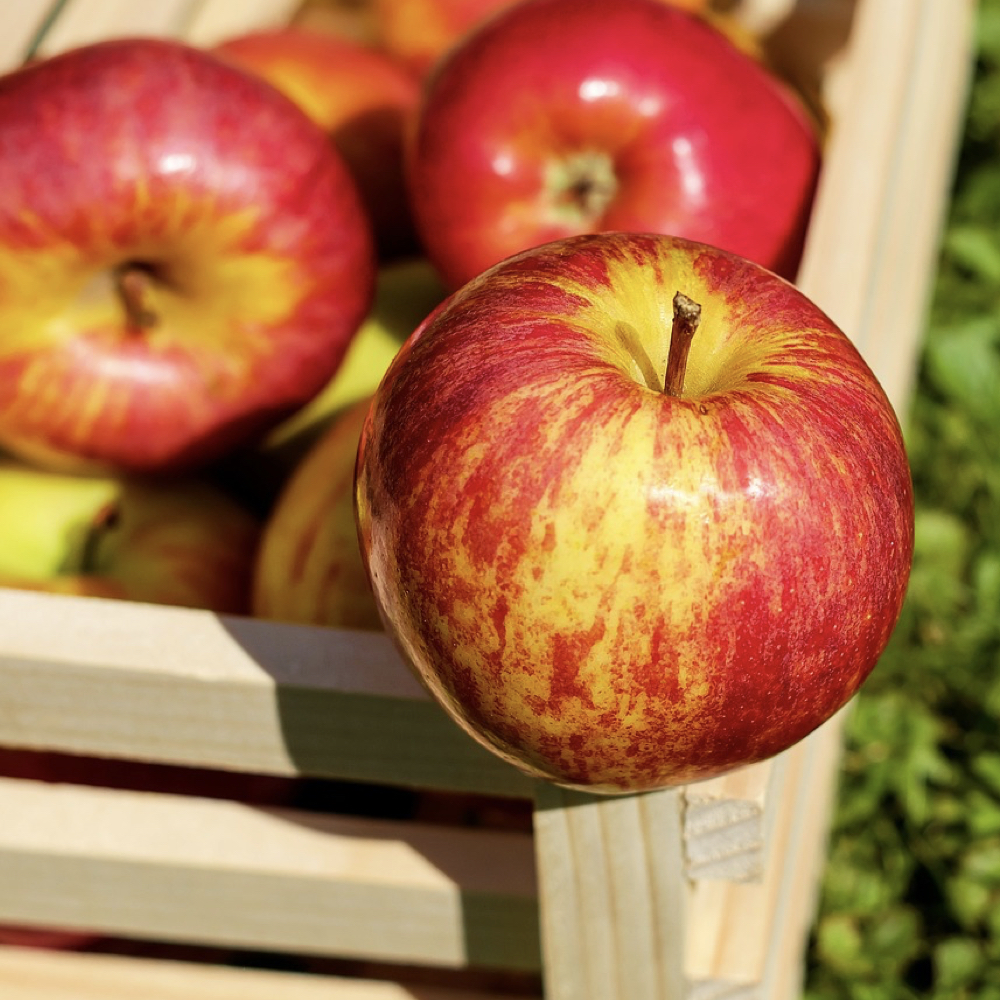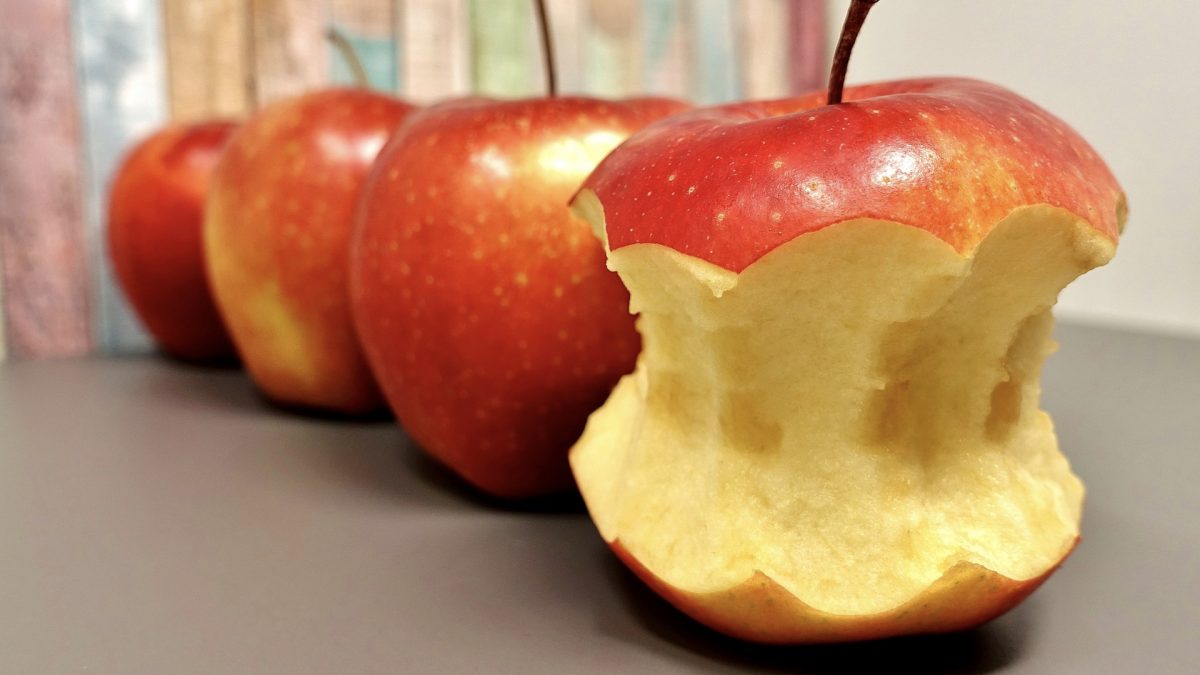
Apples
Find out more about the latest research on apples in the videos below.
Nearly 500 researchers from more than 300 institutions in 50 countries spent years developing the 2010 Global Burden of Disease Study, the largest analysis of risk factors for death and disease in history. The massive study determined that the leading cause of both death and disability in the United States was the American diet, followed by smoking. What did they determine to be the worst aspect about our diet? Not eating enough fruit.
In my Daily Dozen, recommend a daily serving of berries, among the most antioxidant-packed food category, in addition to three servings a day of other fruits.
Anyone who says they don’t have time to eat healthfully has never met an apple. For those who grew up in a world dominated by Red Delicious and Granny Smith, I’m happy to report there are thousands of varieties. Health-wise, crab apples probably top the charts, but tastewise, my personal favorite is Honeycrisp—or any pick-your-own variety I can find locally. My family buys apples by the half bushel!
If you like drinking your fruit, blending is better than juicing to preserve nutrition. Juicing removes more than just fiber. Most of the polyphenol phytonutrients in fruits and vegetables appear to be bound to the fiber and are only liberated for absorption by the friendly flora in your gut. When you merely drink the juice, you lose out on the fiber and all the nutrition that was attached to it. Even just cloudy apple juice, which retains a bit of the fruit fiber, appears to have nearly triple the phenolic antioxidants compared to clear apple juice.
Whereas greater consumption of whole fruits has been associated with a lower likelihood of developing type 2 diabetes, Harvard University researchers found that greater juice consumption was associated with higher diabetes risk.
For substantiation of any statements of fact from the peer-reviewed medical literature, please see the associated videos below.
Image Credit: Pixabay. This image has been modified.
Popular Videos for Apples

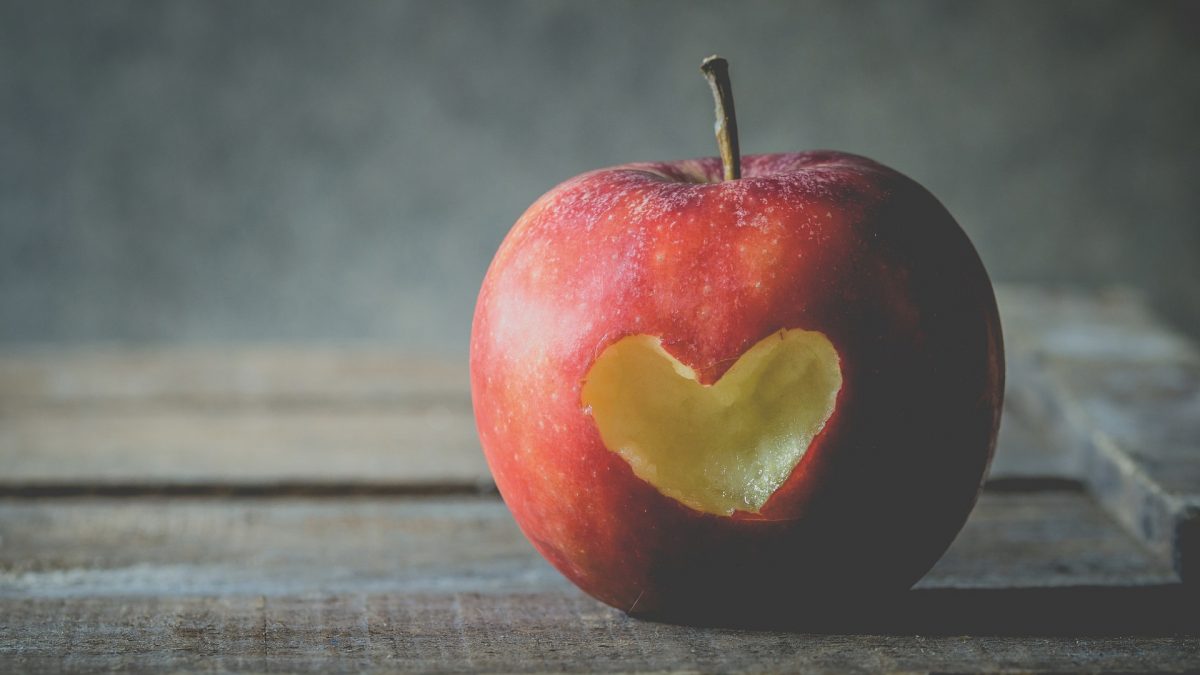
Are Apples the Best Food for a Better Sex Life in Women?
Addyi (flibanserin), the drug marketed for “hypoactive sexual desire disorder,” is ineffective and unsafe. What...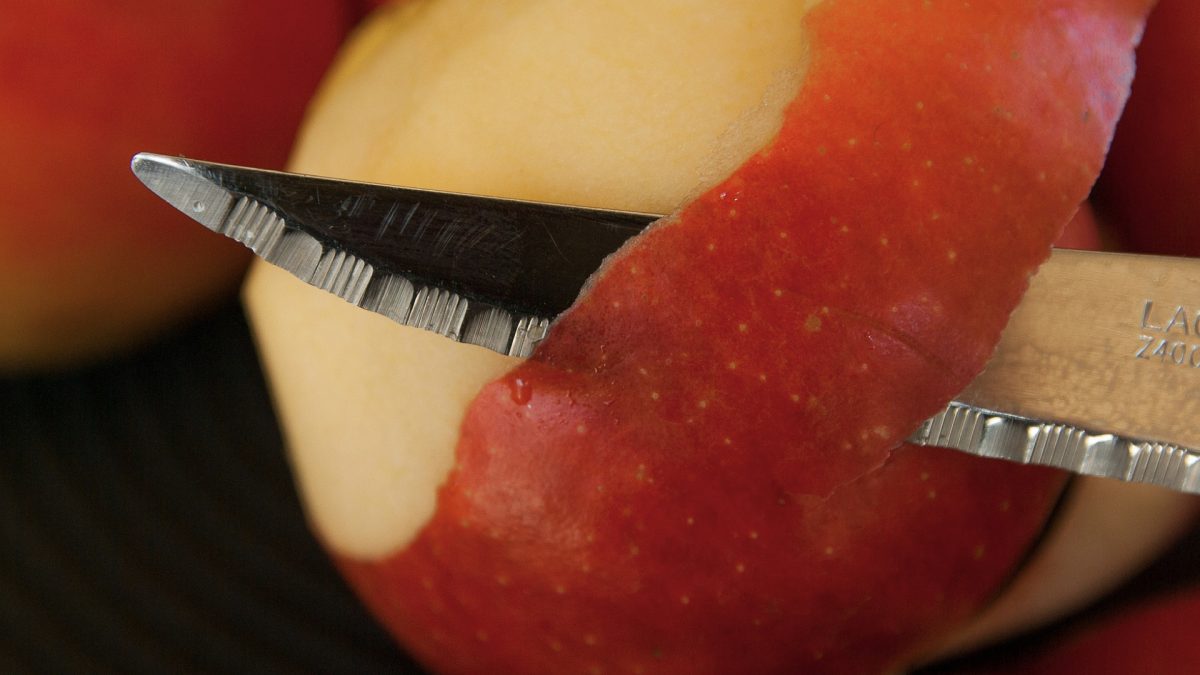
Apple Peels Put to the Test for Chronic Joint Pain
Are the health benefits associated with apple consumption simply due to other healthy behaviors among...
The Antioxidant Effects of Açai vs. Apples
Açaí berries are touted for their antioxidant power, but does that translate into increased antioxidant...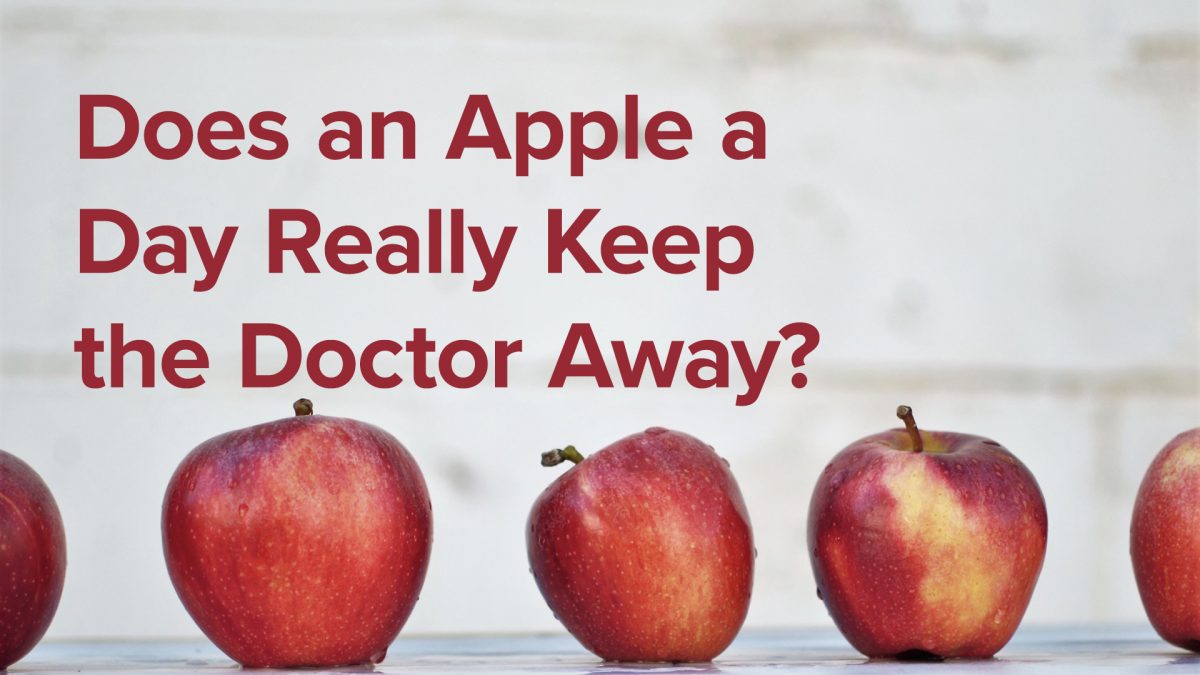
Does an Apple a Day Really Keep the Doctor Away?
Which would save more lives: eating an apple a day or taking statin drugs?All Videos for Apples
-

The Highest Antioxidant: Apple, Bean, Berry, Lentil, or Nut?
The best apple, bean, berry, lentil, and nut are the ones you’ll eat the most of; but if you don’t have a strong preference, which has the highest antioxidant power?
-

How to Get Enough Polyphenols for Life Extension
Is the link between flavonoid consumption and longevity cause-and-effect, and are all sources of flavonoids equally healthy?
-

Anti-Inflammatory Foods: The Benefits of Berries
Which fruits have anti-inflammatory effects and which do not?
-

Banana vs. Mango Smoothies for Polyphenol Absorption
How can you mediate the phytonutrient-destroying enzyme in avocados, bananas, and mushrooms?
-

How to Get Rid of Garlic Breath
After study participants took some garlic, researchers gave them whey protein, lemon juice, green tea, chlorophyll, 7UP soda, a raw pink lady apple, a cooked apple, parsley, spinach, and mint leaves. Which do you think worked best?
-

How to Naturally Reduce Wrinkles with Food
Almonds are put to the test in a randomized controlled trial for facial wrinkles.
-

Fruits and Vegetables Put to the Test for Boosting Mood
A randomized controlled trial investigates diet and psychological well-being.
-

How to Boost Brain BDNF Levels for Depression Treatment
Fasting and exercise can raise BDNF levels in our brain, but this can also be achieved by eating and avoiding certain foods.
-

What to Eat for Stroke Prevention
More than 90% of stroke risk is attributable to modifiable risk factors.
-

Evidence-Based Weight Loss – Live Presentation
In this live presentation, Dr. Greger offers a sneak peek into his book How Not to Diet.
-

For Flavonoid Benefits, Don’t Peel Apples
Peeled apples are pitted head-to-head against unpeeled apples and spinach in a test of artery function.
-

Are Apples the Best Food for a Better Sex Life in Women?
Addyi (flibanserin), the drug marketed for “hypoactive sexual desire disorder,” is ineffective and unsafe. What about dietary approaches for female sexual dysfunction?
-

Does an Apple a Day Really Keep the Doctor Away?
Which would save more lives: eating an apple a day or taking statin drugs?
-

Shark Cartilage Supplements Put to the Test to Cure Cancer
Shark cartilage supplements carry risks, but so do many cancer treatments. The question is, do they work?
-

The Best Source of Resveratrol
Is there any benefit to resveratrol? If so, should we get it from wine, grapes, peanuts, or supplements?
-

Apple Peels Put to the Test for Chronic Joint Pain
Are the health benefits associated with apple consumption simply due to other healthy behaviors among apple-eaters?
-

Are Avocados Healthy?
Avocado consumption can improve artery function, but what effect might guacamole have on cancer risk?
-

The Best Diet for Fibroids
The same diet that helps regulate hormones in women may also reduce exposure to endocrine-disrupting pollutants.
-

The Antioxidant Effects of Açai vs. Apples
Açaí berries are touted for their antioxidant power, but does that translate into increased antioxidant capacity of your bloodstream when you eat them?
-

How Smoking in 1959 Is Like Eating in 2019
Given that diet is the number-one cause of death and disability, nutrition is surely the number-one subject taught in medical school, right? And it’s certainly the number-one issue your doctor talks with you about, right? If only. How can there be such a disconnect between the available evidence and the practice of medicine?
-

Berries vs. Pesticides in Parkinson’s Disease
Berries counteract the neurotoxic effects of pesticides in vitro, potentially explaining why berry consumption is associated with lower risk of developing Parkinson’s disease.
-

Which Fruits and Vegetables Boost DNA Repair?
Every hour, there are 800 incidents of DNA damage in our bodies. Which foods help us patch back up: apples, broccoli, celery, choy sum, lemons, lettuce, oranges, persimmons, or strawberries?
-

Specific Receptors for Specific Fruits and Vegetables
Dietary diversity is important because each plant family has a unique combination of phytonutrients that may bind to specific proteins within our body.
-

Do Raisins Cause Cavities?
Dried fruit has long been thought to contribute to tooth decay, but what does the science say?
-

Which Foods Increase Happiness?
Certain foods are linked not only to increased happiness, but also to greater “eudaemonic” well-being—feelings of engagement, creativity, meaning, and purpose in life.
-

Eating More to Weigh Less
Energy density explains how a study can show participants lose an average of 17 pounds within 21 days while eating a greater quantity of food.
-

Liquid Calories: Do Smoothies Lead to Weight Gain?
If our body doesn’t register liquid calories as well, why are blended soups more satiating than the same ingredients eaten in solid form?
-

Green Smoothies: What Does the Science Say?
Might disrupting the fiber by blending fruit result in overly rapid sugar absorption?
-

Diet and GERD Acid Reflux Heartburn
Which foods should we eat and avoid to prevent and treat acid reflux before it can place us at risk for Barrett’s esophagus and cancer?
-

How to Prevent a Stroke
Insufficient intake of fiber-rich foods may lead to the stiffening of our arteries associated with risk of having a stroke.
-

Paleo Diets May Negate Benefits of Exercise
The deleterious effects of a Paleolithic diet appear to undermine the positive effects of a Crossfit-based high-intensity circuit training exercise program.
-

If Fructose Is Bad, What About Fruit?
Does the fructose naturally found in fruit and fruit juice have the same adverse effects as excess “industrial fructose” (table sugar and high fructose corn syrup) and if not, why not?
-

How Much Added Sugar Is Too Much?
Are table sugar and high fructose corn syrup just empty calories or can they be actively harmful?
-

Juicing Removes More than Just Fiber
The majority of polyphenol phytonutrients may be bound to fiber, helping to explain the marked difference in health impacts between whole fruit and fruit juice.
-

Treating Asthma with Plants vs. Supplements?
Whole fruits and vegetables were compared to both antioxidant pills, as well as supplements containing fruits and vegetable extracts, for their ability to treat seasonal allergies, improve lung function, and control asthma.
-

Caloric Restriction vs. Animal-Protein Restriction
The lifespan extension associated with dietary restriction may be due less to a reduction in calories, and more to a reduction in animal protein (particularly the amino acid leucine, which may accelerate aging via the enzyme TOR).
-

How to Reach the Antioxidant “RDA”
Even nine servings of fruits and vegetables a day may not reach the minimum recommended intake of antioxidants if one doesn’t make the right choices.
-

Counteracting the Effects of Dioxins Through Diet
Phytonutrients in certain plant foods may block the toxic effects of industrial pollutants, like dioxins, through the Ah receptor system.
-

Tell Your Doctor if You Eat Grapefruit
The role white and pink (red) grapefruit may play in weight loss and cholesterol control, as well as the suppression of drug-clearance enzymes within the body.
-

Fighting the Blues with Greens?
Natural monoamine oxidase enzyme inhibitors in fruits and vegetables may help explain the improvement in mood associated with switching to a plant-based diet.
